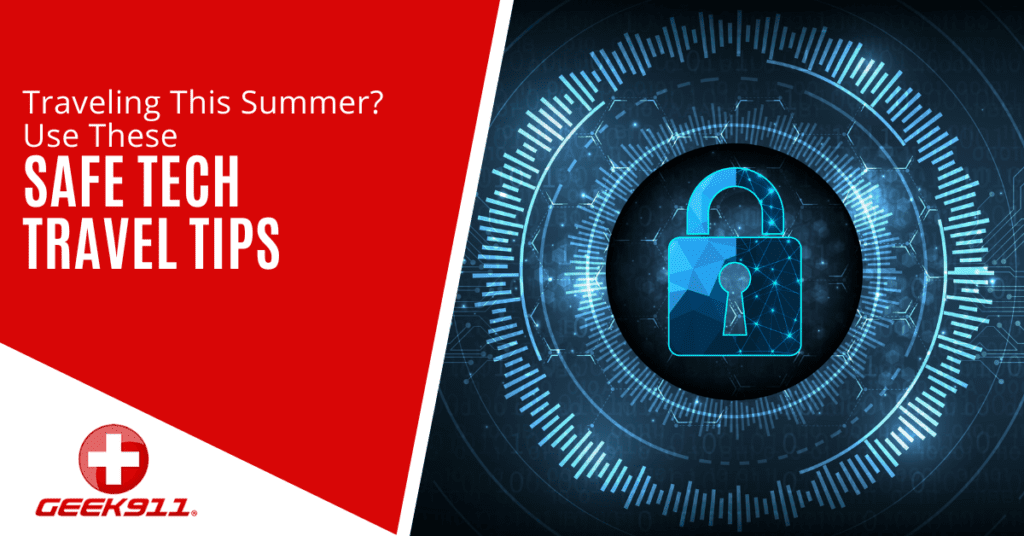Traveling This Summer? Use These Safe Tech Travel Tips

If you’re planning a summer vacation, you might be more concerned with having fun than with keeping your technology and data safe. While on vacation, some dangers arise, devices may be lost or stolen, you may become a victim of hackers or scammers, or you may not have the connectivity you anticipate.
A survey says nearly 42.3 million individuals will be traveling this summer, and as is anticipated, there will be a lot of accessing email from unfamiliar places, urgent Zoom calls, and the search for free Wi-Fi. In all of this, IT departments know they will have to work extra hours, as employees will look to access business data from locations other than the office. The thought of cyberattacks and cybersecurity is pushed to the sidelines as the issues at hand take preeminence.
According to Statista, 50% of CISOs of companies that have adopted remote work in the United States claim that there has been an increase in targeted cyberattacks due to the risks that come with remote work. Whether you’re planning a tropical getaway or a thrilling adventure, it’s crucial to prioritize safety during your travels. As technology plays a significant role in our lives, incorporating safe tech travel tips into your itinerary can enhance your overall experience and provide peace of mind.
By following these guidelines and remaining attentive, you may protect your personal information and workplace data no matter where your adventures take you.
Tech Travel Tips for the Summer
Here are some helpful tips to keep you and your devices safe this summer and even when summer is over.
- Safeguard Your Internet Connection
Public Wi-Fi is frequently unprotected. As a result, cybercriminals can easily watch your internet activities and steal important information. As an added security when traveling this summer, consider purchasing a portable Wi-Fi hotspot device or utilizing the data tethering feature on your phone to create an encrypted and private Wi-Fi network wherever you go.
Also, encrypt your internet connection with a Virtual Private Network (VPN) to make it more challenging for hackers to intercept your data. A paid VPN service is worthwhile, and the majority of VPN services include user-friendly apps for your devices.
- Secure Your Devices
While traveling is an exciting aspect of life, there is a high chance that you are going to keep working or going to be connected in one way or the other. For this, your devices should be adequately secured.
Ensure you use strong passwords and pins to lock them down on all your devices. Also, consider adding biometric authentication capabilities like fingerprint scanning or facial recognition.
- Update Your devices
Before commencing your journey, ensure all the devices you will be taking along are updated to the latest software. This includes your operating system, apps, and security software. System updates often include critical security fixes, which protect your devices from the most recent cyber threats, as cybercriminals always seek vulnerabilities to gain access to your devices.
- Protect Your Online Accounts
Personal and professional information can be found in your online accounts. As a result, they are eye-catching targets for cybercriminals. Ensure to set up multi-factor authentication for your online accounts before embarking on your summer vacation.
This implies that even if someone guesses or steals your password during your vacation, they will be unable to access your account unless the second factor is provided. Accessing your accounts requires a password and a second factor, usually a code given to your phone.
- Backup Data Regularly
Backups on a regular basis also protect you against data loss caused by device failures or malware attacks. This could be to a USB drive or a cloud service. You can still access your crucial data and images if your device is lost or stolen.
Set up automatic backups to keep your files up to date, and consider encryption for physical storage.
- Practice Safe Browsing
Be wary and watchful of any unexpected emails or messages requesting personal information. Staying cyber secure is also about being mindful of your online behavior. Hackers frequently increase their phishing attacks during peak travel seasons, posing as airlines or travel firms to deceive you into disclosing your personal information. As a result, before clicking on any links or supplying any information, always confirm the sender’s authenticity.
Also, the HTTPS padlock sign in the browser’s address bar ensures an encrypted connection between devices and websites, protecting data and preventing interceptions by hackers. Avoid using unencrypted information on websites.
- Invest in Security Tools
Investing in security tools is a must for everyone, especially those traveling this summer. Security tools like antivirus and anti-malware software help to protect your devices from malware attacks sent by malicious cybercriminals to your devices. When writing your to-do list for your summer travels, ensure this is on it.
Also, select a trustworthy security option that proffers real-time defense, automatic updates, and the capacity to probe and remove existing malware.
- Be Cautious of Social Media Usage.
Be mindful of your social media presence while on your summer travels. Although social media platforms are a great way to share vacation stories with friends and family, you are advised to be cautious with what you post on social media accounts, especially if your accounts are open to the whole public.
Do not provide your precise location, travel itinerary, or personal information. This information can be used to devise elaborate extortion schemes or guess security questions. Review your social media privacy settings and only allow friends or specified groups to see your posts.
- Change your Passwords on Your Return
Upon returning from your summer vacation, ensure to change the passwords of any applications used during your trip. Even up to your device lock pin or password, all passwords must be changed as soon as you return from your trip. This should be on your must-do list.
Secure Yourself Today
Remember, cybersecurity is a journey to embark on, not a destination. Staying secure is an ongoing process that requires your attention and effort. Contact us today at GEEK911 for data safety solutions.
